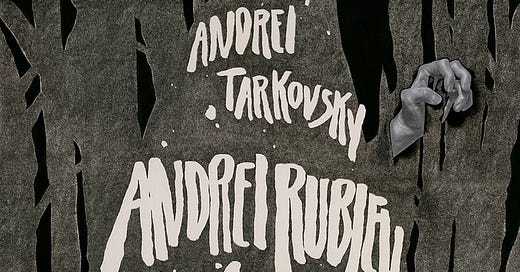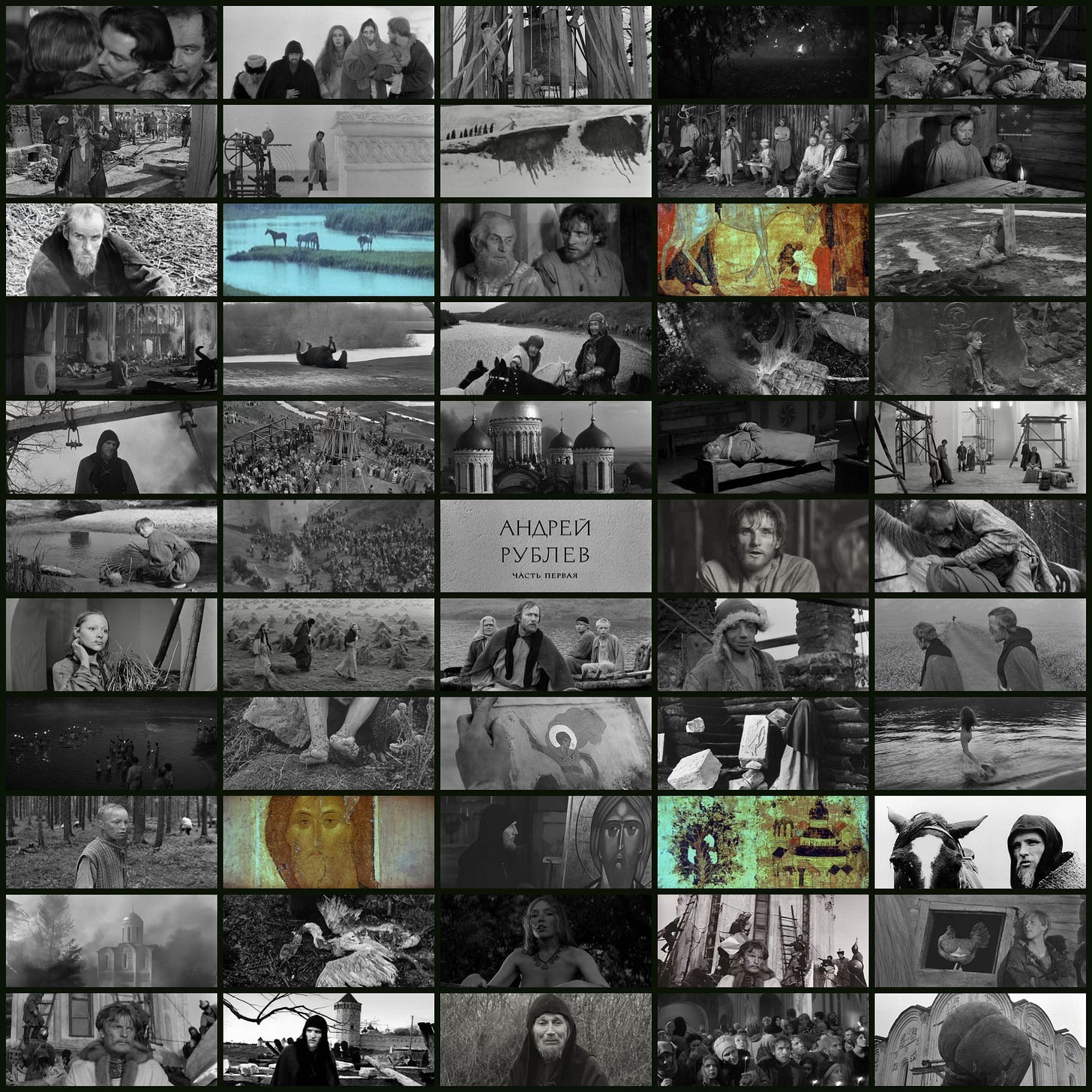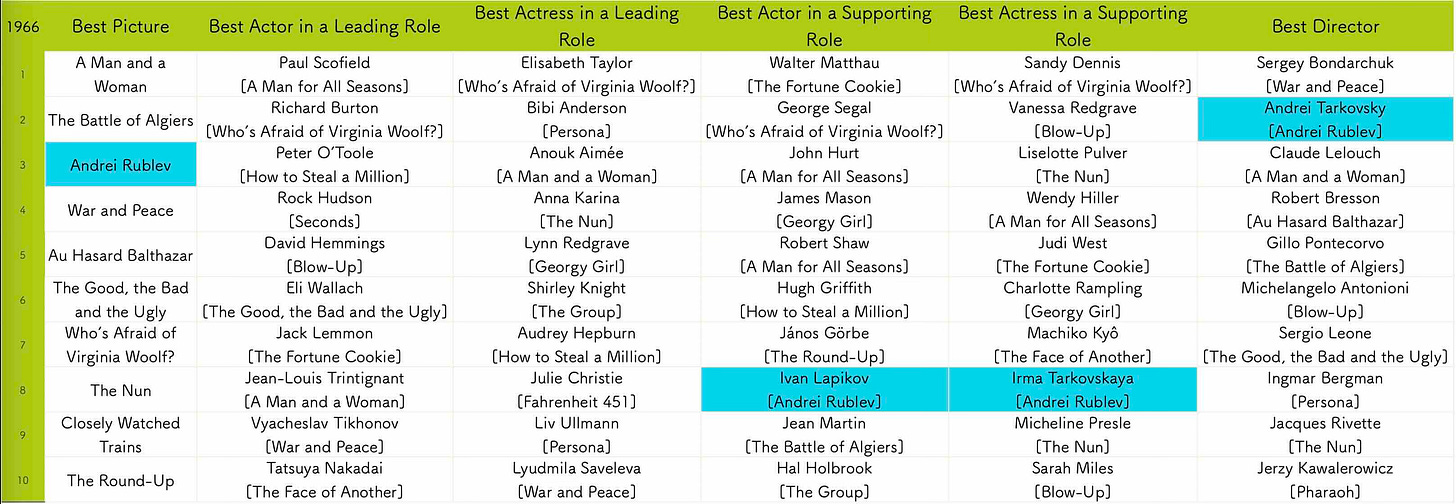No sophomore slump for cinematic virtuoso Tarkovsky, ANDREI RUBLEV, is an epic biopic about the eponymous icon painter and a saint of Orthodox Church (c. 1360 - c. 1430). However, apart from his artistic bequest, little is known about Rublev’s life, who was a monk in the Andronikov Monastery. So Tarkovsky takes an artistic license to blend his subject’s life and historical events to present a sweeping overview of the early 15th Century Russia under the Orthodox Church doctrines.
A prologue spellbindingly conjures up the ecstasy and perils of overreaching oneself, the price for flights of fancy. After which, the film is divided into 8 chapters, chronologically integrates Rublev (Solonitsyn, fairly wet behind the ears in his feature debut) as a focal point either participating in or simply witnessing the misfortunes of the secular world: a jester persecuted (Rolan Bykov is tauntingly buffoonish), cenobites falling out - Kirill (Lapikov, bringing forth the most relatable affective conviction among the cast), Rublev’s compadre, chooses laicization out of a fit of jealousy and disappointment, pagans severely punished, artisans viciously blinded, a hecatomb executed during the raid of the Tatars on Vladimir (instigated by a fraternal power grab) and during which Rublev taking a vow of silence and renouncing his vocation, as penance for killing a Tartar invader, which is eventually broken after a campanological victory of a young bell maker Boriska (Burlyaev, graduating from IVAN’S CHILDHOOD to flourish a bumptious greenness thankfully pays great dividends) that could be viewed as a metaphor of a young country’s Promethean creativity and vitality, followed by a colored epilogue, examining some of Rublev’s most famous icons, exuding sacrality and piety to empathize a mundane world.
Tarkovsky’s Russia in the Middle Ages is a realm of intermittent betrayal, pain and suffering, fomented by self-seeking conflicts and barbarity. Only via the person of the mute holy fool girl (impressively played by the maestro’s first wife Irma, whose unfeigned primitiveness becomes an antidote to the medieval scourge), Tarkovsky offers a reprieve to the most innocent and vulnerable mortal being, whose fate casts a cynical shadow on the secular bliss. After all, religion is the only cure, it alleviates afflictions, facilitates miracles, grants repentance. Even to an atheist’s eyes, Tarkovsky’s entreaty doesn’t ring hollow.
At a youthful age of 34, Tarkovsky displays an awe-inspiring capacity of maneuvering an enormous set and his characteristic long takes have already taken shape to perfect a stance of observational devotion that feels both pious and unsentimental, even cruelty and fatality is gazed upon with a deeply felt compassion. An ox set on fire, a horse tripping from stairs, Tarkovsky knows all too well how to invoke a vicarious presence that achieve a gestaltist effect. Every frame flows in a majestic pace and often culminates in a strikingly inspirational composition. Narrative lacunae and arbitrary actions are not spelt out but left as they are. Poetry seems immanent within the colligation of those industriously engineered and conceptualized images. Watching a Tarkovsky’s picture is tantamount to embark on a hallowed pilgrimage, it is never an easy task, but not one single frame is a filler, as if each is embedded with a speaking connotation that is elusive to us viewers. To that effect, “cinema is a religion” is the most pertinent declaration for Tarkovsky’s genius.
referential entries: Tarkovsky’s IVAN’S CHILDHOOD (1962, 8.2/10), MIRROR (1975, 8.6/10); Sergey Bondarchuk’s WAR AND PEACE (1966, 8.4/10); Miklós Jancsó’s THE ROUND-UP (1966, 7.8/10).
English Title: Andrei Rublev
Original Title: Andrey Rublyov
Year: 1966
Genre: Biography, Drama, History
Country: Soviet Union
Language: Russian, Tatar, Italian
Director: Andrei Tarkovsky
Screenwriters: Andrei Tarkovsky, Andrey Konchalovskiy
Music: Vyacheslav Ovchinnikov
Cinematography: Vadim Yusov
Editors: Tatyana Egorycheva, Lyudmila Feyginova, Olga Shevkunenko
Cast:
Anatoliy Solonitsyn
Ivan Lapikov
Nikolay Grinko
Nikolay Sergeev
Irma Tarkovskaya
Nikolai Burlyaev
Yuriy Nazarov
Yuriy Nikulin
Bolot Beyshenaliev
Rolan Bykov
Mikhail Kononov
Nikolay Grabbe
Irina Miroshnichenko
Anatoliy Obukhov
Vladimir Titov
Nelli Snegina
Vyacheslav Tsaryov
Nikolay Glazkov
Rating: 8.4/10






